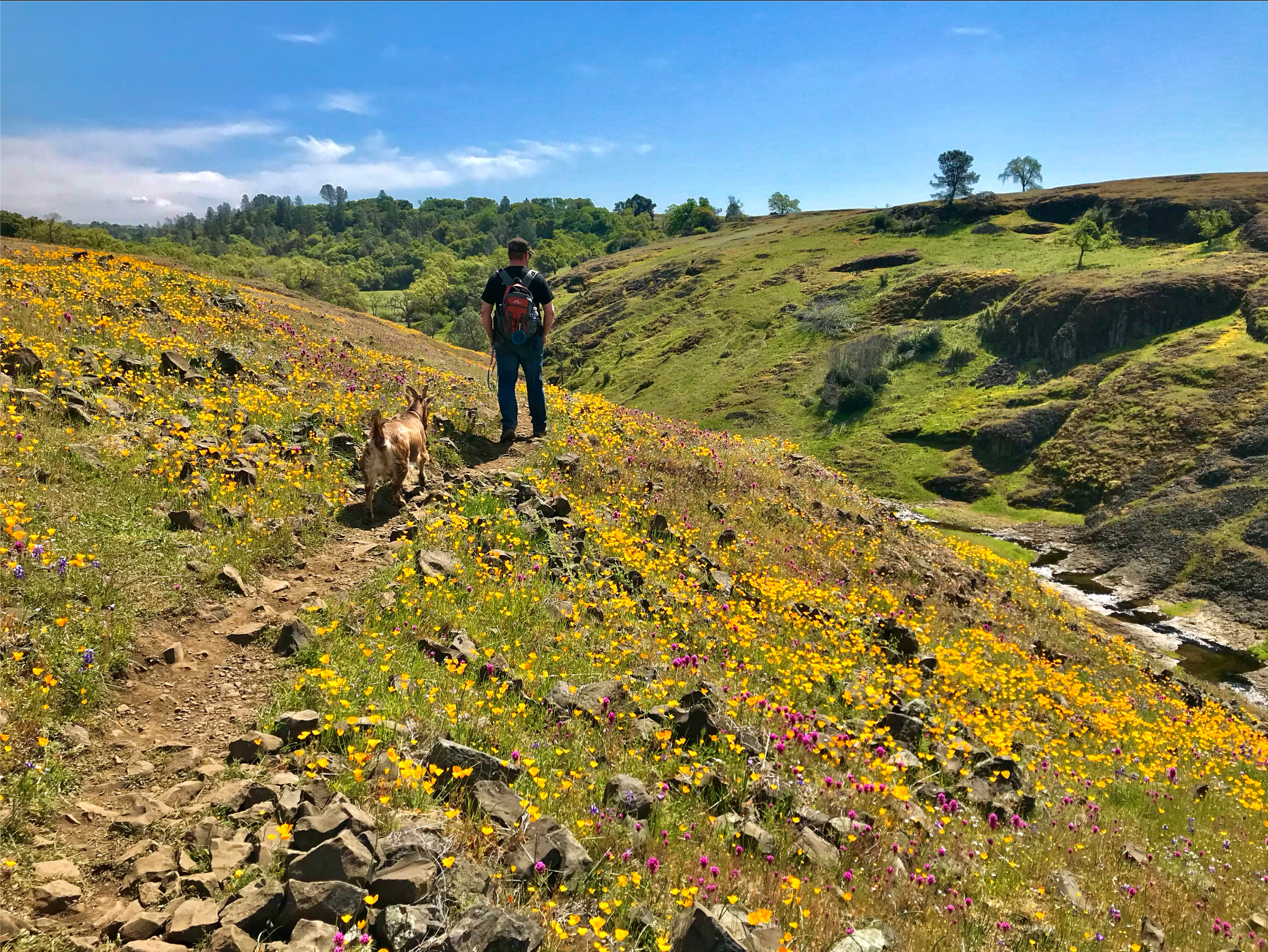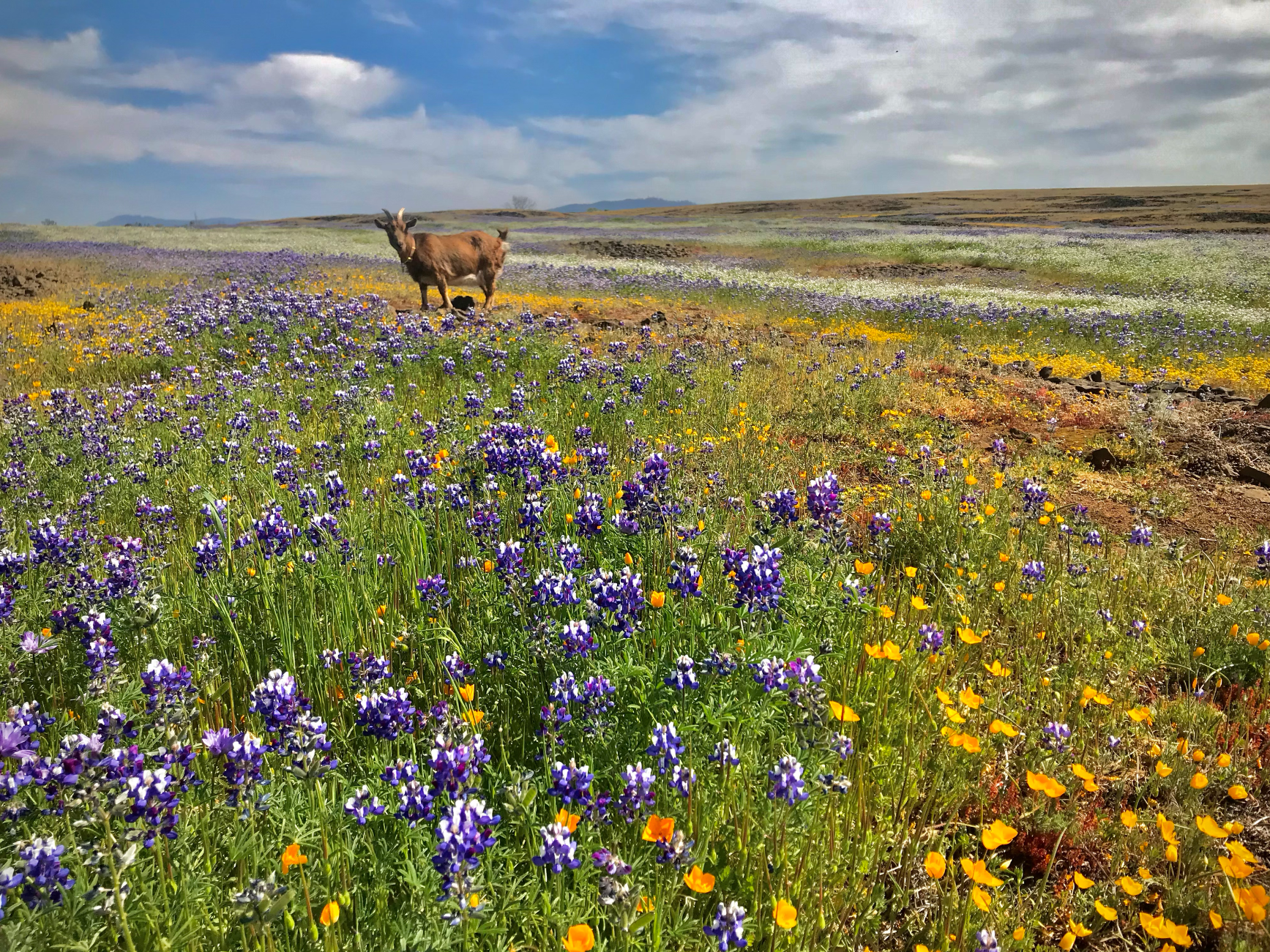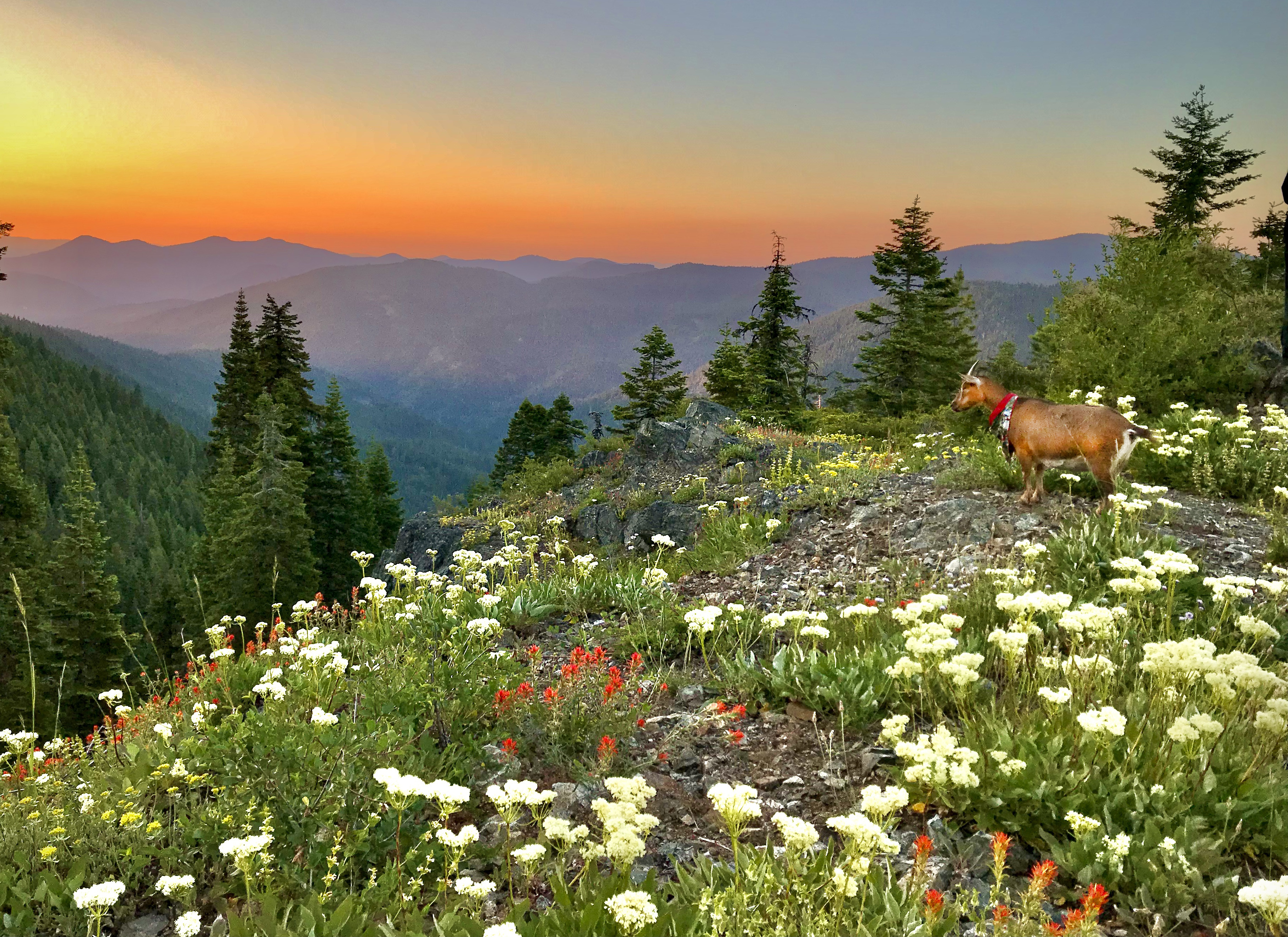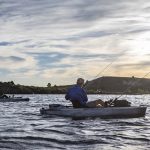From late February to September, you’ll find spectacular wildflower displays up and down the West Coast. The wildflower season begins in late winter throughout the Southern California desert and works its way up to the PNW when the snow melts and gives way to flowers in the Cascade’s higher elevations. One of the best ways to experience this explosion of color is by taking a hike, so put the pedal to the metal and plan a road trip to some of the best wildflower destinations on the West Coast.
Sheep Lake to Sourdough Gap, Washington

The hike to Washington’s Sheep Lake is kid-friendly. @CateBattles
For those visiting Mount Rainier with pets, the hike to Sheep Lake and Sourdough Gap is a fantastic Fido-friendly alternative since it’s situated just outside of the park boundary along Chinook Pass. The 6-mile roundtrip out-and-back trail presents breathtaking views of the Cascades, giving hikers a glimpse of Mt Rainier and the nearby Naches Peak. The picturesque Sheep Lake is nestled in a sub-alpine area that showcases a dazzling display of wildflowers in July and August. After passing the lake, the trail slowly climbs for about a mile until you reach Sourdough Gap, a small saddle in a rocky ridge that provides spectacular aerial views of Sheep Lake and the Crystal Lake Basin.
Stay: Rainier Wings Packwood RV Park in Packwood puts guests close to Mt. Rainier National Park.
Lower Table Rock, Medford, Oregon

Wildflowers blanket the ground on top of Medford’s Lower Table Rock. @Catebattles
One of the best opportunities to witness spring blooms in Southern Oregon is a hike to Lower Table Rock, a distinct geological feature that offers commanding views of the Rogue River Valley. The basalt mesa was created by a lava flow over 7 million years ago and is home to a unique ecosystem. Due to the fact that the volcanic rock is impermeable, rainwater collects in the depressions, forming vernal pools. These pools are a rare habitat that supports a federally protected species of fairy shrimp and a state-protected plant called the dwarf wooly meadowfoam which is found nowhere else in the world. With the abundance of water that is collected during the rainy months, March and April wildflowers blanket the mesa. This 4.8 out-and-back hike is rated as moderate, as it involves a steady climb to reach the top. On the way up, you’ll pass a scrub oak savannah and a madrone forest before emerging into a sea of blue, yellow, and pink flowers that carpet the mesa. At the top, hikers can walk along the old landing strip or follow the trail around the perimeter while taking in the panoramic views of Mount McLoughlin, the Rogue River, and the rim of Crater Lake on a clear day.
Tips: This is one of the most popular hikes in Southern Oregon so be prepared for spring crowds unless you arrive early. Once at the top, you are in full sun. Due to the fact this is an environmentally protected area, pets are not allowed on the trail.
Stay: Rogue Valley Overniters in Grants Pass sits close to Interstate 5 near the banks of the gorgeous Rogue River.
North Table Mountain Ecological Reserve, Oroville, California

Wild poppies cover the ground at Table Mountain Ecological Reserve. @catebattles
One of the most awesome hikes west of the Sierra can be found just outside of Oroville at North Table Mountain Ecological Reserve. This 3,300-acre natural area sits on a volcanic plateau, the remnant of ancient lava flows. While exploring North Table Mountain, enjoy spectacular spring wildflowers along with waterfalls, canyons, lava outcrops, and unique vernal pools. The best way to explore the reserve is by taking the Phantom Falls Loop; a moderately level 7-mile trail that winds you across the volcanic mesa, passing 7 waterfalls and colorful wildflowers as far as the eye can see. Depending on the winter rainfall, the wildflower display varies from year-to-year, but usually starts in early March and lasts throughout April. Poppies, lupine, and owl clover are a few of the many species that call North Table Mountain home.
Before you go:
Make sure to download a map, as it can be tricky deciphering where the trail is at times. This area is a well-known wildflower destination not far from Chico, so your best chance for solitude is by arriving shortly after sunrise on a weekday. Leashed pets are allowed, and like their humans, must stay on the trail to avoid disturbing the flora. This is a sunny hike, with little shade, so bring plenty of water and prepare for hot, full-sun hikes.
Stay: Berry Creek Rancheria RV Park in Oroville is a gateway to Lake Oroville and Feather River recreation areas.
Wallace Creek, Carizo Plain National Monument, California

Yellow and Purple flowers cover the hillsides of the Carrizo Plain. @Catebattles
The Carrizo Plain is one of the best-kept secrets in California and is also a prime locale to view spring wildflowers. This national monument is home to one of the most famous sections of the San Andreas fault, which is clearly visible in the landscape. Located outside of Santa Margarita in Central California, the essentially untouched public land is comprised of vibrant wildflower-adorned hillsides in the spring, historic farms and ranches, and the alkaline and often dry, Soda Lake. For an easy hike with incredible views of wildflowers and the fault line, take the 1.7-ile out-and-back trail at Wallace Creek. This short interpretive trail lets hikers see the fault line in action, and you’ll also be surrounded by a sea of yellow, purple, and pink flowers throughout April.
Know Before you go:
There is little cell reception in the Carrizo Plain so consider downloading a map of the area. Additionally, make sure to watch the weather as rain can make the roads impassable. Pets are welcome, camping is abundant, and there is no cost to enter the national monument.
Stay: On the coast, Pismo Sands RV Park in Oceano features new deluxe rental cabins and an amazing play structure for kids.
Oregon Coast Trail, Oregon

Wildflowers add extra beauty to Oregon’s coast in early summer. @CateBattles
Without a doubt, the Oregon coast is one of the most magical coastlines in the U.S., and that becomes even more apparent when spring and summer wildflowers adorn its rugged shore. Unlike other states, all 362 ocean-hugging miles that encompass the Oregon Coast are open to the public, including the Oregon Coast Trail that begins at the California border and ends at the mouth of the Columbia River. From sandy beaches, sitka forests, picturesque headlands, massive dunes, and craggy cliffs, nearly every bend of the trail offers spectacular views. Starting in the spring and lasting most of the summer, vibrant foxglove, lupine, and ice plants add a splash of color to the already majestic landscape.
Stay: Just south of the Oregon Coast Trailhead, Sea Perch RV Resort in Yachats has a multi-story clubhouse with gym and ocean-view sitting room.
Fortynine Palms Oasis , Joshua Tree National Park, CA

The Southern California desert comes to life in early spring. @CateBattles
When most people think of the desert- they imagine a bunch of sand as far as the eye can see. However, if you’re lucky enough to visit in late winter and early spring- the landscape comes to life. Throughout March and early April, Joshua Tree is a fantastic place to witness the desert in bloom — especially during a “super bloom” year. Two distinct desert ecosystems make this a favorite spot for flora enthusiasts as the Mojave and the Colorado deserts offer up very different vegetations due to contrasting elevations and annual precipitation. One of the best spots to experience the wildflowers and colorful cacti is the 3-mile out-and-back hike at Fortynine Palms Oasis. This well-maintained trail leads you along a ridgeline that offers beautiful views before descending into the palm oasis in a rocky canyon.
Tips: This hike provides little shade and can reach extremely hot temperatures, so be prepared with plenty of water and sun protection.
Stay: Indian Waters RV Resort & Cottages in Indio is a top-rated resort with two pools and a spa.
Skyline Loop, Paradise, Mount Rainier National Park, Washington

The wildflowers at Mount Rainier attract visitors from around the world. @CateBattles
It would be criminal to leave Mount Rainier’s Skyline trail off the list of wildflower hikes, because this place is Paradise. If John Muir considered it his favorite wildflower meadow, you know it’s got to be impressive. The best time to enjoy this trail is late August and early September when the wildflowers are peaking, creating a lush rainbow-colored carpet. This 5.6-mile loop trail features the breathtaking Myrtle Creek Falls along with the massive glaciated peaks of Mount Rainier. As you wind your way around the alpine meadow, take in the views of the surrounding mountains, most notably, Mount St. Helens, Mount Adams and even Oregon’s Mount Hood.
Tip: For a peak experience, arrive at sunrise to avoid the national park crowds and get the best light of day for Wildflower destinations on the West Coast.
Stay: Rainier Wings Packwood RV Park (see above).
Dalles Mountain Ranch, Columbia River Gorge, Washington
Located within the Columbia Hills Historical State Park, Dalles Mountain Ranch is a stunning 7-mile loop hike that takes you through hillsides that become engulfed with vibrant balsamroot and lupine throughout April and May. It’s one of the best Wildflower destinations on the West Coast. While there, take in the sweeping views of the Columbia River Gorge as well as the iconic Mount Hood. During the hike, you’ll also pass old ranch equipment and rusty cars which is always a bonus for photographers. Additionally, when you are exploring the rest of the Columbia Hills Historical State Park, stop to look at the petroglyphs and Cecilo Falls, known to be the longest continuously inhabited location in North America. For those wanting to stay South of the Columbia River, the Oregon side offers great wildflower hiking trails as well, including Mosier Plateau, Rowena Crest, Memaloose Hills, and Catherine Creek.
Tips: Being close to Portland, all of these hikes can become very busy during peak hours, so arrive early in the morning. Additionally, be aware that ticks are abundant during the spring season.
Stay: Bridge RV Park & Campground in White Salmon is located near the Columbia River, giving guests access to adventure on the water.

Frankie at North Table Mountain. @CateBattles
Wildflower Resources
Want to know what’s blooming and where? Check the current bloom status at www.desertusa.com and www.wildflowersearch.org.
Etiquette for Wildflower destinations on the West Coast
Last bud not least, here are some important things to consider while enjoying wildflower hikes.
• Pets and their humans should always stick to the trails — never trample wildflowers. Please avoid destroying the flowers for an Instagram picture.
• Most places discourage picking the flowers, so read the rules before hitting these Wildflower destinations on the West Coast.
• Though there are many wildflower hikes that are pet-friendly, several environmentally critical spots like reserves and national parks prohibit pets so check first before bringing Fido.




